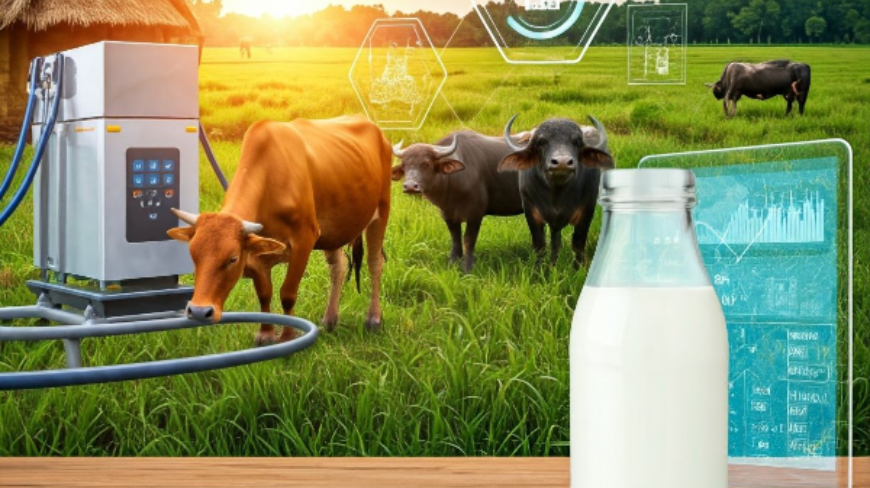The dairy industry has always been a cornerstone of agriculture, providing essential products that form the basis of many diets worldwide. However, the complexities of managing dairy operations—from milk production and processing to distribution and sales—can present significant challenges. With the rise of artificial intelligence (AI) and advanced technologies, dairy management is entering a new era, where ERP (Enterprise Resource Planning) automation is revolutionising processes and enhancing operational efficiency. Pi-ERP is a comprehensive ERP solution for Dairy business, providing the latest features which are the need of the day. Here we will go through some futuristic solutions that AI based ERP solutions can have.
The Challenges of Dairy Management
The dairy sector faces numerous challenges that can impede growth and efficiency:
1. Complex Supply Chains:
The dairy supply chain involves multiple stakeholders, including farmers, processors, distributors, and retailers. Managing these interactions can be convoluted and prone to inefficiencies.
2. Inventory Management:
Maintaining the right stock levels of raw materials and finished products is critical. Overstocking can lead to waste, while understocking can result in missed sales opportunities.
3. Quality Assurance:
Ensuring product quality and compliance with regulatory standards is paramount. Any lapse in quality control can lead to significant repercussions, including financial loss and damage to reputation.
4. Data Overload:
The dairy industry generates vast amounts of data, from production metrics to sales figures. Extracting meaningful insights from this data can be daunting without the right tools.
5. Financial Complexity:
Managing finances—tracking costs, forecasting budgets, and analysing profitability—requires meticulous attention to detail, often complicating operations.
6. Labor Management:
As the dairy industry grows, managing a diverse workforce and optimising labour costs becomes increasingly challenging.
The Role of ERP Automation in Dairy Management
ERP systems have emerged as a vital solution for addressing the challenges faced by dairy businesses. By integrating various functions into a single platform, ERP automation streamlines operations, improves decision-making, and enhances productivity.
1. Streamlined Operations:
One of the primary benefits of ERP systems is the ability to centralise operations. By integrating functions such as inventory management, production planning, sales, and finance, dairy businesses can eliminate silos, enhance collaboration, and reduce redundancies. This streamlined approach not only saves time but also ensures that all departments are aligned toward common goals.
2. Enhanced Inventory Management:
AI-powered ERP systems provide real-time inventory tracking and forecasting capabilities. This enables dairy managers to maintain optimal stock levels, automate reordering processes, and minimise waste. For instance, AI algorithms can analyse historical sales data to predict future demand, allowing businesses to adjust inventory accordingly. This proactive approach reduces the risk of overstocking and understocking, ensuring a more efficient supply chain.
3. Improved Quality Control:
Quality assurance is critical in the dairy industry, and ERP systems equipped with AI can significantly enhance this aspect. Automated quality checks can be integrated into production processes, ensuring compliance with regulatory standards and industry best practices. AI can also monitor parameters such as temperature, pH levels, and microbial counts in real time, enabling quick interventions if any deviations are detected. This proactive quality control not only ensures product integrity but also builds consumer trust.
4. Data-Driven Decision Making:
Dairy operations generate a wealth of data, but without the right tools, extracting actionable insights can be challenging. ERP systems equipped with AI analytics can process vast amounts of data and generate meaningful reports. By providing insights into key performance indicators (KPIs), such as production efficiency, sales trends, and financial performance, dairy managers can make informed decisions that drive growth and profitability.
5. Financial Management and Reporting:
Financial management is a complex aspect of dairy operations. An ERP system can automate various financial processes, such as tracking expenses, managing budgets, and generating reports. AI algorithms can analyse financial data to identify trends and anomalies, enabling managers to make proactive financial decisions. This level of financial oversight not only improves profitability but also ensures that businesses remain compliant with regulatory requirements.
6. Workforce Optimization:
Managing a diverse workforce is essential in the dairy industry. ERP systems can streamline labour management by tracking employee performance, scheduling shifts, and managing payroll. AI can analyse workforce data to identify patterns, enabling managers to optimise staffing levels based on demand. This not only improves operational efficiency but also enhances employee satisfaction by ensuring adequate staffing during peak periods.
The Future of Dairy Management with AI and ERP
As technology continues to advance, the integration of AI into ERP systems will only deepen, offering even more opportunities for innovation in dairy management. Some potential future developments include:
- Predictive Analytics: Advanced AI algorithms will be able to forecast trends with greater accuracy, predictive maintenance solution in dairy and allowing dairy businesses to anticipate market changes and adjust strategies accordingly.
- IoT Integration: The Internet of Things (IoT) can be integrated into ERP systems to provide real-time monitoring of equipment and production processes. Sensors can track everything from milk quality to equipment performance, alerting managers to potential issues before they escalate.
- Blockchain for Traceability: Integrating blockchain technology with ERP systems can enhance traceability throughout the supply chain. This will allow consumers to track the origin of their dairy products, promoting transparency and trust.
- Enhanced Customer Engagement: AI-driven CRM (Customer Relationship Management) tools integrated into ERP systems will allow dairy businesses to better understand customer preferences and behaviours, leading to personalised marketing strategies and improved customer loyalty.
Conclusion:
The integration of AI and ERP automation in dairy management represents a significant leap forward for the industry. By addressing core challenges and streamlining operations, these technologies empower dairy businesses to enhance efficiency, improve quality, and make data-driven decisions. As the dairy industry continues to evolve, embracing these innovations will be crucial for remaining competitive and meeting the demands of consumers in a fast-changing market.
In conclusion, the future of dairy management is bright, with AI and ERP at the helm, driving operational excellence and sustainable growth in a vital industry. As businesses invest in these technologies, they will not only improve their bottom lines but also contribute to a more efficient and transparent dairy supply chain.






